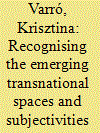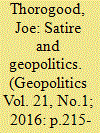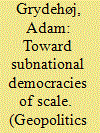|
|
|
Sort Order |
|
|
|
Items / Page
|
|
|
|
|
|
|
| Srl | Item |
| 1 |
ID:
145415


|
|
|
|
|
| Summary/Abstract |
In this paper, I delve into the complex ways in which Palestine is conceptualised as both a concrete and amorphous territory through an examination of the everyday practices of displaying images and imagining Palestine. Building from fieldwork conducted with Palestinian Jordanians, I analyse and contextualise images and maps of Palestine that they display in their homes and communities. I complicate what these images seem to represent with insights from interviews I conducted about how they spatially imagine Palestine. Throughout the paper I show that images and imaginings of Palestine are quite diverse and have various territorial meanings. Yet, as varied and seemingly different as these images and imaginings may be, they are nevertheless intimately linked through territorial discourses of displacement and rootedness, as well as through the everyday practices of remembering and resistance. Thus, I contribute to recent scholarship within geopolitics by highlighting (1) the value of examining images and imaginings of everyday geopolitics in tandem with one another, (2) the complex and fluid ways in which territory configures into everyday geopolitics, and (3) that amorphous notions of territory need to be integrated into work on territory more broadly.
|
|
|
|
|
|
|
|
|
|
|
|
|
|
|
|
| 2 |
ID:
145420


|
|
|
|
|
| Summary/Abstract |
This article presents In Time (Andrew Niccol, 2011) as a film that illuminates the role of borders at a local level and their relationship with the transnational interests of financial corporations. In Time imagines a near future in which time has replaced money as the currency. In this world, people have been genetically engineered to stop aging at 25, so, when they reach that age, they have to earn time or they die within a year. The film, shot in Los Angeles, portrays a world divided into “zones” and focuses on two of them: Dayton, a working-class area, and New Greenwich, a financial district. Drawing on this setting, In Time explores the roles of borders in the processes by which the later extracts value from the former. In order to investigate such processes, I consider the different kinds of borders that appear in the film, including not only fences and walls, but also other borders related to wealth, time, etiquette, behaviour, race, and surveillance. Close examination of borders, spatial dynamics, and characters’ behaviour elucidate the rationale behind the socioeconomic structures that the film depicts, who benefits from them, and what their interests are. Focusing on such aspects, this article argues that the different borders that appear in the film control the movement of people and money, thereby contributing to several conditions that benefit financial firms: the generalisation of debt, the casualisation of labour, workers’ resignation, the protection of the financial sector, and the criminalisation of the poor.
|
|
|
|
|
|
|
|
|
|
|
|
|
|
|
|
| 3 |
ID:
145414


|
|
|
|
|
| Summary/Abstract |
The article examines the (in)effectiveness of the United Nations Security Council (UNSC) as an enforcer of peace and security in the post–Cold War global order and teases out the tensions between the mandate and its enforcement. Through an examination of the cases of Syria and Mali and the related UNSC resolutions, the article demonstrates that the council’s role is primarily guided by the geopolitical visions and interests of its veto-wielding permanent members (P5). The action or inaction of the council depends on whether a particular situation is tangential or core to the concern of a permanent member or a group of members. Geopolitical visions guiding the interests of the permanent members dominate the UNSC-mandated concerns of international peace and security. While the conflict situations in Syria and Mali posed similar problems, the council emerged largely effective in the later and ineffective in the former owing to the clash of geopolitical visions. In the case of Syria the clash of visions eclipsed the global concerns for peace, while in the case of Mali the absence of the clash enabled the council to enforce peace.
|
|
|
|
|
|
|
|
|
|
|
|
|
|
|
|
| 4 |
ID:
145412


|
|
|
|
|
| Summary/Abstract |
Recent critical toponymies have convincingly demonstrated that studying place names also reveals much about geopolitics and power relations. In this paper, we propose a theoretical framework for interpreting these toponymies, in order to better decipher, theorise, and compare the many very rich case studies in the field. Our first argument is that the focus of enquiry should be place naming processes rather than place names themselves. We then show that place naming is a dispositif in the Foucauldian sense. This allows us to build a framework that distinguishes between (a) four types of geopolitical contexts, from which place naming processes tend to stem; (b) four types of technologies that are commonly used; and (c) three types of actors. Lastly, we identify the preferential combinations and nexuses between these building blocks of place naming contexts, technologies, and actors.
|
|
|
|
|
|
|
|
|
|
|
|
|
|
|
|
| 5 |
ID:
145416


|
|
|
|
|
| Summary/Abstract |
This paper examines the corollaries of the exceptional treatment of Palestinian children under the Israeli military rule. It is shown how the widespread and systematic ill treatment of Palestinian children accrues from exceptional provisions and lack of legal cover of the Israeli military law. Such lack constitutes a precarious condition under which Palestinian children are not treated as children but as a security threat legally accountable for their acts, in many respects with ways similar to adults. Precarity, the paper argues, is produced through three conditions. First, the lack of protection is institutionalised through the legal, territorial and population-regulating techniques internal to state channels. Second, the lack of protection delegates significant power to the discretion of what Judith Butler calls the ‘petty sovereigns’ – to the soldiers, interrogators, police officers, etc., who are asked to rely on their own judgment when making decisions on the fundamental matters regarding the order and justice, even life and death of children. Third, the use of discretionary power is not only encouraged by the legal system and its exceptions; it also works in tandem with the institutional culture of impunity that accepts the violent disciplining, even torture, of Palestinian children.
|
|
|
|
|
|
|
|
|
|
|
|
|
|
|
|
| 6 |
ID:
145419


|
|
|
|
|
| Summary/Abstract |
Recently proliferating practice- and people-centred accounts have offered useful insights on cross-border regionalism and cooperation in the European Union. However, the assumption of these studies concerning the dominantly national character of people’s ‘spatial socialisation’ and practices has produced a subtle but problematic bias towards nation-state (re)bordering and, relatedly, has implied a lack of recognition for the formation of transnational subjectivities and spaces. Inspired by fieldwork observations made in the Dutch-German-Belgian borderlands, the aim of this paper is to sketch a research agenda that comes to grips with the emerging transnational dimension of cross-border cooperation. Key to this agenda is the reconsideration of the notion of practice so as to acknowledge that cross-border cooperation entails simultaneous rebordering and debordering processes and is constituted through situated and embodied actions. The paper discusses discourse theory and practice theory as two useful perspectives for such a rethinking and outlines the key methodological implications for future research on cross-border cooperation.
|
|
|
|
|
|
|
|
|
|
|
|
|
|
|
|
| 7 |
ID:
145421


|
|
|
|
|
| Summary/Abstract |
Humour and laughter have become the subject of recent geopolitical scrutiny. Scholars have explored the affirmative and liberatory possibilities of humour, and the affective bodily dimensions of laughter as tools for transformative action in critical geopolitics. Humour that is vulgar and politically ambiguous is yet to be explored as a potent geopolitical avenue of enquiry. Studies of satire have suggested that rather than contesting entrenched geopolitical beliefs, satirical shows can serve to further divide audiences both amenable and antagonistic to the satire in question. I argue that this should not involve a wholesale rejection of satirical shows, as humour that uses irony, subversion, and other discursive techniques is just one way satirical media becomes an effective commentator on political issues. I examine the show South Park and argue its satire combines bodily and scatological humour with more traditional satirical techniques to produce a comedy that ridicules contemporary issues by reducing complex politics to the most basic and crass condition possible. This is defined in a Bakhtinian sense of the body grotesque, a social inversion through reference to the common bodily functions of all human beings.
|
|
|
|
|
|
|
|
|
|
|
|
|
|
|
|
| 8 |
ID:
145417


|
|
|
|
|
| Summary/Abstract |
The winding down of military operations in Iraq and Afghanistan has prompted a scholarly debate around America’s evolving strategic role and posture in the broader Middle East. Allegedly, its isolated geographical position and “seapower” condition would allow the US to behave as an “offshore balancer”, by pulling back militarily, retreating from alliances and formal security commitments and relying on the different regional powers to balance each other. However, it remains unclear to what extent a seapower like the US would be able to effectively manipulate the balance of power in the Middle East from offshore. An examination of US strategy in the Middle East from 2009 to 2015 suggests that the main puzzle Washington confronts is not so much whether to retreat offshore or remain engaged onshore, but rather to work out the terms of onshore engagement. As this article shows, current US strategy in the Middle East revolves around the need to reconcile two seemingly contradictory sets of pressures. The first is that war fatigue, financial pressures and the ongoing reorientation of military-strategic resources towards the Asia-Pacific theatre do require that the US cuts back on its engagement elsewhere, including in the Middle East. The second relates to Washington’s deep-seated conviction that there is a direct correlation between US forward presence and the preservation of a favourable balance of power in the Middle East, which is itself critical to the security of other regions, including the Asia-Pacific. By discussing the relationship between seapower and forward presence, this article places US strategic retrenchment in the Middle East in perspective. In particular, the article transcends the rather vague notion of “balancing” and concentrates on US perceptions about which geographical areas in the Middle East need to be balanced, and how, i.e., through which alliances, instruments and policies.
|
|
|
|
|
|
|
|
|
|
|
|
|
|
|
|
| 9 |
ID:
145418


|
|
|
|
|
| Summary/Abstract |
While non-sovereignty is often presented as a rational and pragmatic political status option, this paper asserts that the smallness of overseas territories in various ways obstructs and distorts the formation of an informed local public debate about this political status. Due to personalistic politics, patron-client relations, excessive executive dominance, and the lack of professional media, which all are consequences of a small population size, the extent to which citizens of overseas territories are involved and represented in status debates is limited. The paper uses the 2010 political reforms of the Dutch Caribbean islands as an illustrative case study, to show how the smallness of these islands has obstructed a balanced consideration of status options among the population.
|
|
|
|
|
|
|
|
|
|
|
|
|
|
|
|
| 10 |
ID:
145413


|
|
|
|
|
| Summary/Abstract |
Although democracy is often discussed as a universally applicable ideology, the liberal democratic state tends to assess democracy on the basis of government institutions. This paper argues that democratic institutionalism favours national governments and makes it difficult for subnational governments to expand their governance capacity and exercise additional powers. Greenland, Shetland, and Tresco (Isles of Scilly) serve as case studies of different subnational strategies for exercising greater governance capacity: 1) Actual adherence to democratic form (Greenland), 2) Symbolic adherence to democratic form (Shetland), and 3) Operating external to democratic form (Tresco). Despite the efforts of local governance actors, governance in these three island communities has proved problematic in terms of democratic legitimacy, legality, and/or effectiveness. It is argued that pressure toward the development of liberal democratic government institutions can in fact decrease the quality of subnational democracy. This requires a reassessment of definitions of democracy and authoritarianism. It is necessary to pursue place-specific and community-sensitive democracies of scale if we wish to democratically empower local communities.
|
|
|
|
|
|
|
|
|
|
|
|
|
|
|
|
|
|
|
|
|